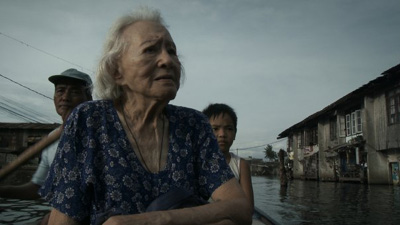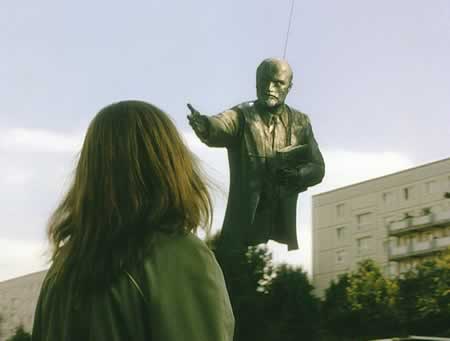Women reign in this unstoppably comic romantic farce directed by famous Spanish filmmaker Pedro Almodovar. I do not know, but Spanish actresses really have a very unique way of conveying cinematic energy. Maybe it's their relentless native language or the contrast of their seemingly ordinary, straight-laced feminine features with unfitting comedy that has able to pull it off. They inhabit the screen with deadpan hysteria and overwhelming desperation that they never seem to bother with any kind of consciousness with how they look or act.
Do you reckon how some actresses act on a comedy film obviously aware that they're in on it anticipating every punchlines and absurdly crude behaviors? "Women on the Verge of a Nervous Breakdown" came wallowing in the opposite, making its characters squeeze out stupefying humor from the odds of their internalized romances than the jokes concerning them. It's a pure comedy film parodying the maddening residues of a romance and the secretive yet strangely amusing life of 'lovers' than real 'couples'. It's never a rom-com romp. Yes, the film's comic foibles is at play, but the idea of romance is so far away.
The film's visual composition is very impressive considering that it's more concerned with its characters than its surroundings (its various settings are treated merely as narrative 'addresses' than truly involving set pieces). And accompanying the far-fetched reality of the whole plot, the film is uniquely exuberant in its colors (especially in Pepa's (the beautifully, dryly humorous Carmen Maura) scenes in her apartment), depicting quite subtly, although with vibrant hues, the colorfully crazy nuances of a mistress' life.
Yet with its overwhelming, intricately written female characters that show the likes of a squeamish woman involved with Shiite terrorists, one who faked her sanity to get out of a mental institution and a woman whose facial features resemble a Picasso painting losing her virginity in a dream, which director Almodovar may have injected some feminist empowerment into, "Women on the Verge of a Nervous Breakdown" is never a film mainly concerned about feminism. Above all, I think it's more inclined with destroying the foundations of chauvinism and the romantic narcissism of men. Hell, we even see our women characters at the peak of emotional vulnerability after their devotions to their 'loving' men spiral out of their control. Is that purely feminist? No, I do not think so. I think the film is more of a tongue-in-cheek portrayal of the overall sloppiness of modernist love; quick and easy, passionate yet dire.
There's a scene in the film where the main object of affection, Ivan (a namesake of mine), Pepa's ex-lover, Lucia's (classy madness by Julieta Serrano) ex-husband, and Paulina's (Kiti Manver) current flame, is shown dubbing a Hollywood film with his Spanish language. The actor in the film within the film, Sterling Hayden, is commanding Joan Crawford to repeat what he says ("Lie to me. Tell me you've always loved me. Tell me you would have died without me."), but her mouth, although spouting words, never lets out any sounds. It was all silence on her part.
Yes, in the film's immediate reality, Joan Crawford's dubber (who is Pepa) is not yet present. But Almodovar, through that subtle scene, may have expressed his particular stance to what women must do in times when men's affectionately 'hollow' words pervade itself and when their romantic authoritarianism takes over: Shut up. Think. Wait.
Well, Pepa certainly didn't, and in the next scene, as she hears Sterling Hayden's words dubbed by Ivan through her headset, she fainted. Stung by the flowery words of an aging 'Don Juan', she was. But then there's always a time for sobriety.
Do you reckon how some actresses act on a comedy film obviously aware that they're in on it anticipating every punchlines and absurdly crude behaviors? "Women on the Verge of a Nervous Breakdown" came wallowing in the opposite, making its characters squeeze out stupefying humor from the odds of their internalized romances than the jokes concerning them. It's a pure comedy film parodying the maddening residues of a romance and the secretive yet strangely amusing life of 'lovers' than real 'couples'. It's never a rom-com romp. Yes, the film's comic foibles is at play, but the idea of romance is so far away.
The film's visual composition is very impressive considering that it's more concerned with its characters than its surroundings (its various settings are treated merely as narrative 'addresses' than truly involving set pieces). And accompanying the far-fetched reality of the whole plot, the film is uniquely exuberant in its colors (especially in Pepa's (the beautifully, dryly humorous Carmen Maura) scenes in her apartment), depicting quite subtly, although with vibrant hues, the colorfully crazy nuances of a mistress' life.
Yet with its overwhelming, intricately written female characters that show the likes of a squeamish woman involved with Shiite terrorists, one who faked her sanity to get out of a mental institution and a woman whose facial features resemble a Picasso painting losing her virginity in a dream, which director Almodovar may have injected some feminist empowerment into, "Women on the Verge of a Nervous Breakdown" is never a film mainly concerned about feminism. Above all, I think it's more inclined with destroying the foundations of chauvinism and the romantic narcissism of men. Hell, we even see our women characters at the peak of emotional vulnerability after their devotions to their 'loving' men spiral out of their control. Is that purely feminist? No, I do not think so. I think the film is more of a tongue-in-cheek portrayal of the overall sloppiness of modernist love; quick and easy, passionate yet dire.
There's a scene in the film where the main object of affection, Ivan (a namesake of mine), Pepa's ex-lover, Lucia's (classy madness by Julieta Serrano) ex-husband, and Paulina's (Kiti Manver) current flame, is shown dubbing a Hollywood film with his Spanish language. The actor in the film within the film, Sterling Hayden, is commanding Joan Crawford to repeat what he says ("Lie to me. Tell me you've always loved me. Tell me you would have died without me."), but her mouth, although spouting words, never lets out any sounds. It was all silence on her part.
Yes, in the film's immediate reality, Joan Crawford's dubber (who is Pepa) is not yet present. But Almodovar, through that subtle scene, may have expressed his particular stance to what women must do in times when men's affectionately 'hollow' words pervade itself and when their romantic authoritarianism takes over: Shut up. Think. Wait.
Well, Pepa certainly didn't, and in the next scene, as she hears Sterling Hayden's words dubbed by Ivan through her headset, she fainted. Stung by the flowery words of an aging 'Don Juan', she was. But then there's always a time for sobriety.












